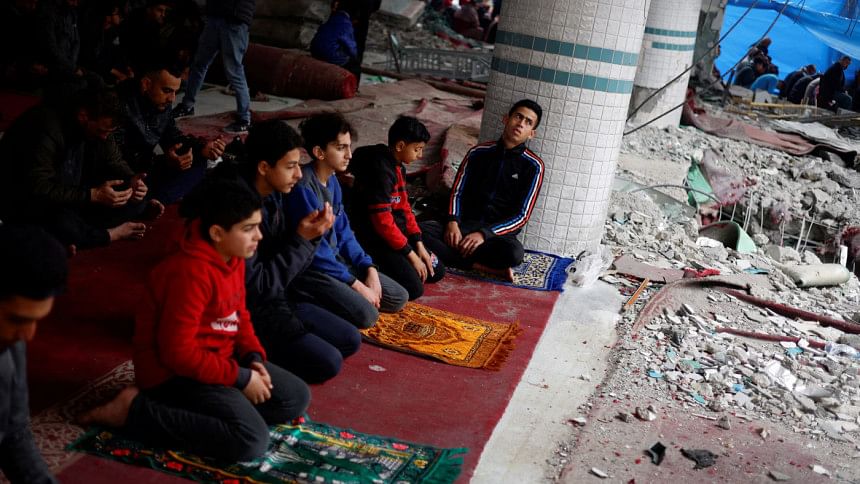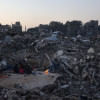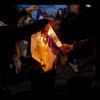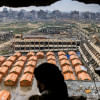Since we cannot say ‘never again’...

Just like a new year becomes an old one, there is an impulse to be bound by old faiths which reassure us that beginnings only signal that an end is near. It takes time to accept that all beginnings don't come with ends—some just go about a ceaseless spiral.
I cannot help but think about the beginning of the United Nations. The UN, which is now calling for a ceasefire in Gaza, was the newly born UN which in 1947 recommended partitioning Palestine into two states: one Arab and one Jewish. The horror of the Holocaust was so fresh then.
The Nakba Day in 1948, which began the process of violently displacing Palestinians and creating collective trauma that defined their national identity, is the day after Israel's independence day. What is the feeling of celebrating independence knowing it marks the darkest day in another people's history?
As Noam Chomsky explains, it is now no secret that Israel is the "strategic asset" in the Arab region that the US will never let go of. When the British and every other European nation voted on and carved Palestine like it was a turkey on a Thanksgiving dinner, no one had invited the rightful residents to the table. Obviously, the British know a thing or two about how to divide a country they have no right over.
The memory of Auschwitz, the ashes in the air, the skeletal bodies with striped clothing clinging to their bodies, didn't make a difference. I remember as a child when I saw the image of "The Falling Man" by photographer Richard Drew; I couldn't sleep for days and had intense nightmares about the man who jumped from the burning towers. Around that same time in my childhood, I also learnt about the Holocaust. I learnt that it was uttered on the Hitler-hit rubble of Europe, "Never again," and I choked up with a smile of hope. But in the aftermath of 9/11, when the US began saying "never again" and turned green, hilly countries into piles of rubbles, did we say "never again"?
What remains of the Palestinian people after the annihilation of their society, cultures, identity, political rights, dreams, and national aspirations? As we witness the last of its people being bombed into the ground, and children don't know how to cry anymore, when will be our chance to look straight into the camera and say "never again"?
There's no end in sight for this maddening violence, there are no reassurances of old faiths, and even if there is, no one is bound by it.
You have to count lives to count their deaths. It cannot be clearer that the West as an entity is not out of the "lord-like" hangover and cannot acknowledge the full humanity of the Global South.
You have to have faces who know you, to know your own identity. If there are no sons and daughters left, can a mother be a mother? Who'll be the Palestinian people when, like a pulse in every beat, there dies another one who knew them?
The original Zionist slogan of "a land without a people for a people without a land" epitomises to what lengths the denial of humanity can go. Wrapping up genocide in the shawl of self-preservation is nothing new. But the irony this time cannot be more in our faces, as the connection to Hitler's rhetoric of self-preservation draws itself.
Language is drafted so that the actual victims are seen as expendable collateral damage while making sure another narrative keeps certain people as victims. As we see children without mothers and mothers without children on destroyed Palestinian porches, the stubbornness to not be wiped out comes off despite the biased lens of Western media. Arundhati Roy said, "There's really no such thing as the 'voiceless.' There are only the deliberately silenced, or the preferably unheard."
As we witness annihilations, standing in the Global South, a collective, hereditary, postcolonial pain scorches us. Looking at the West and how they cover death tolls rising to mountains show how "preferably unheard" the Palestinians are. It's not hard to know the truth, but the main question is: whom do you serve? And whose knowledge are you curating? And in that knowledge, do all deaths count as death? Do you have trouble seeing both Auschwitz and the Gaza Strip?
There's no end in sight for this maddening violence, there are no reassurances of old faiths, and even if there is, no one is bound by it. And standing in this part of the globe, witnessing a people being viciously wiped out, old woes are becoming new habits for us.
Lastly, as we cannot say "never again," all the words above, too, are surplus talk that cannot be heard. But they are for the people whose sky has become enemy ground.
Sumaya Mashrufa is sub-editor at The Daily Star.
Views expressed in this article are the author's own.
Follow The Daily Star Opinion on Facebook for the latest opinions, commentaries and analyses by experts and professionals. To contribute your article or letter to The Daily Star Opinion, see our guidelines for submission.

 For all latest news, follow The Daily Star's Google News channel.
For all latest news, follow The Daily Star's Google News channel. 










Comments